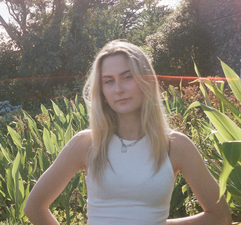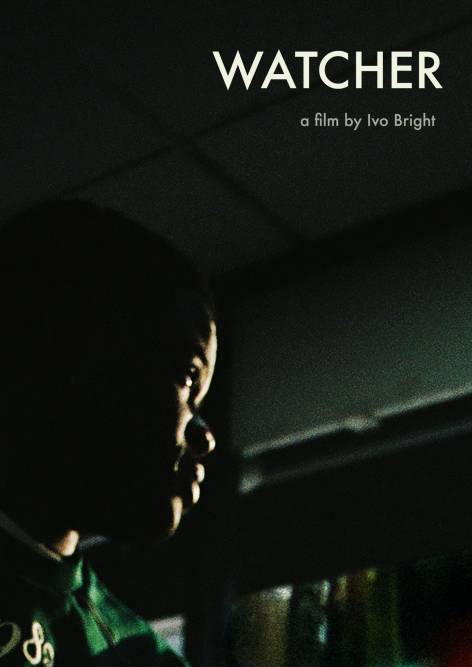Digital Film Production graduate produces award-winning film
hide
Liz Tester graduated in 2022 from the BA (Hons) Digital Film Production course and is about to launch into an exciting new project working on one of the nation’s favourite television shows, Gogglebox.
From navigating life as a freelancer to producing an award-winning film, we chat to Liz about her journey through Ravensbourne and what her life has looked like since graduating.
Could you tell me a bit about what you've been doing since you've graduated?
I’ve been mostly freelancing since I finished university. I’ve had a few opportunities within product assistant, production and managing roles working on things like music videos and both corporate and commercial stuff.
Literally in the past week I’ve also picked up a job working on the TV programme Gogglebox for the next three months. I’m really excited about this as it is an incredible opportunity, but I’m also quite nervous.
That’s incredible! What sort of things will you be doing in this role?
It’s a runner role, so I’ll be driving to different locations and picking up the footage and bringing it back to the edit team in Soho, London.
It will be really long days, because I’ll be driving as far as Manchester and Hull some days.
I’m going to try my best to build connections with the production team and try and get involved in that side of things too. It’s really important for me to make a good impression and then I can hopefully secure some other opportunities off the back of that.
Could you tell me a bit about the film that you have produced?
We shot the film, Watcher, nearly a year ago. It’s crazy how fast that time has gone and just shows how quickly your final year at university flies by.
The film follows the main character, Raheem and his friends, as they spend the day convincing him that there's someone watching and following them, but he can’t see them.
Ivo Bright, who directed the film, said he took inspiration from the film ‘Midsommar’, which incorporates this atmospheric creepiness, rather than just trying to make people jump.
The suspense builds during the duration of the film and brings the audience into the general unease of the characters. I wouldn’t say Watcher is hugely scary, but it’s got that sixth-sense feeling that something strange is going on.
The film was really well received in the festival circuit, which was fantastic. It won a couple of awards; one for best drama and another for best student film.
It’s also had some honourable mentions and short listings and I think we will hear back from others in the summer.
Watcher trailer
hide
What did you learn on your course that helped prepare you for this opportunity?
I think the course provided me with a lot of transferable skills and really constructive knowledge.
I think there is this whole misconception that creative degrees aren’t hard work at all, but it was really challenging.
There was a big focus on the administrative knowledge you need. It prepares you for when things go wrong, as well as when things go right when you are working in industry.
It also helps you when it comes to dealing with people and becoming a good communicator, as well as how to organise yourself.
It is cool to see how, when you go out into industry and work in your first couple of real roles how you can apply this knowledge into practice.
Do you have any other projects in the pipeline that you are working on?
Last year I started writing something that I wanted to submit for British Film Institute (BFI) Funding. BFI is an organisation that provides funding for film and TV development and production.
But then, I had a lot of final major project deadlines which just took over all my time. The writing is still not finished as I feel like I need to be in the right mindset to write. The theme of this is looking at loss, and how people come to terms with it differently.
Also, now I’ve got this new role with Gogglebox, I think this is going to take up all my time for the next few months, so again the writing is on the back burner a bit. Watch this space though!
Before I secured this new role, I was also thinking about applying for a Masters, but this requires a lot of prep work. For the application I needed to create a pitch for a feature or a TV programme and write an essay about my favourite producer, but again I’ve just not had the time.
What are your ambitions for the next few years?
I’m very open to opportunities at the moment. If something falls in my lap, then I’m going to go for it.
Before the Gogglebox opportunity, I was thinking that I would start to go in the direction of agencies and looking for full-time work. Freelancing comes with its own set of challenges; it can be a bit daunting never knowing when your next job will arrive.
If I can secure another freelance role off the back of working on Gogglebox, then I will definitely go for that.
What initially appealed to you about Ravensbourne and your chosen degree?
I was originally studying somewhere else that was very local to where I live.
Growing up, I struggled with a lot of anxiety, but I knew that I still wanted to go to university, so I just thought I would make the best of it and still live at home.
This course wasn’t what I was looking for though. It was a very small class of only seven people, and it seemed to mostly focus on the history of film and wasn’t very contemporary.
I quickly realised that the course wasn’t for me, so I started thinking about transferring somewhere else. I searched ‘film courses in London’ and Ravensbourne came up and it seemed like a good fit.
What appealed to me was the number of different specialisms the Ravensbourne course offered – I hadn’t seen that anywhere else.
I think I’m very creative, but I also think I’m quite business savvy and so I chose the management specialism on the course as this seemed to bridge together those two skill sets.
I can say for certain that I wouldn’t secured the opportunities I have had if I didn’t transfer to Ravensbourne. I’m really glad I made that decision to move courses.
Can you tell us a bit about how you chose your specialism on the course?
It’s weird to think back, because I initially I wanted to go down the cinematography route, which would have set me on a very different path.
What really solidified my choice was looking at which specialism I thought would provide me the most transferable skills.
What are your highlights from your time at Ravensbourne, both personally and professionally?
It is worth saying that a big chunk of my studies took place during covid, but we all made the most of our experience despite the obvious restrictions.
For me, one of my favourite aspects of the course was definitely the people that I met. Even before I had started, we had Facebook groups set up where we could get to know everyone on the course. This made it easier to make friends once we all met in person. Even during covid, we kept close by constantly messaging each other.
In my second year, I lived with two of my best friends from Ravensbourne and we were together through the mini lockdowns that took place. Looking back, this was a very meaningful time in my life.
Professionally, I think the festivals that we got involved in were a big highlight for me. It can be quite stressful creating something, but then getting that recognition at the end and seeing how people are appreciating the work is incredibly rewarding.
I’ve had so much recognition from the lecturers too, which again helped really reinforce that I was on the right path. Like so many of us, I can struggle with imposter syndrome, so it was great to get that encouragement.
We also got to work with the charity Barnardos on a project that was funded by Amazon. The final work was then distributed internally by Amazon. I think this has been great to add these massive brand names to my CV – this always gets picked up in interviews.
Finally, do you have any advice for prospective students?
I would say take full advantage of all the opportunities that come your way and listen to all the advice that you are given.
My other piece of advice is to not be afraid to make mistakes. there is nothing wrong with getting things wrong, as it is how you learn. It’s all about how you can then learn from these mistakes.





